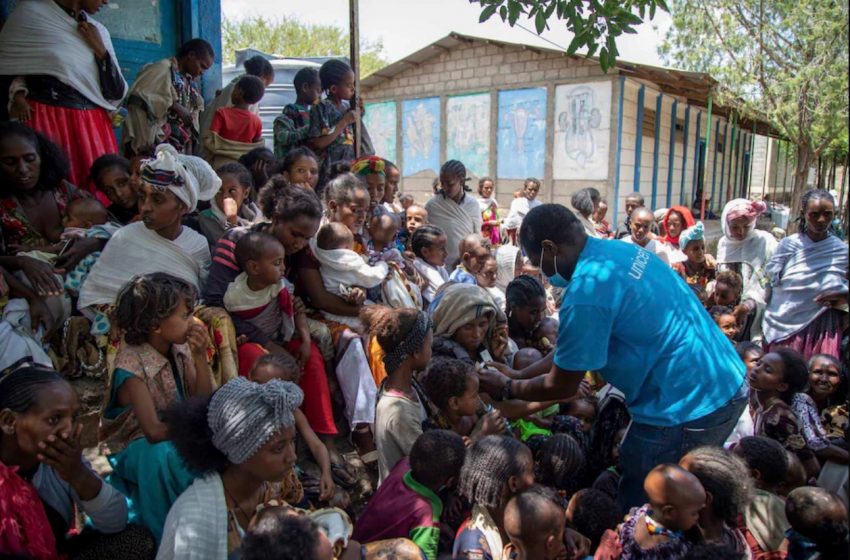
Why the U.S. should call the famine and violence in Tigray a genocide
Source: The Washington Post
October 7, 2021
Over the past 11 months, Ethiopian Prime Minister Abiy Ahmed’s government has killed, raped and tortured ethnic-minority Tigrayans en masse. Will the Biden administration label these acts a genocide and impose appropriate consequences? If not, the United States will effectively greenlight genocide for any leader ruthless enough to follow Abiy’s playbook of secrecy, sexual violence and starvation as weapons of war.
The case against Abiy’s administration is straightforward: His government’s actions, as described by countless international monitors, fit the United Nations’ definition of genocide.
The United Nations defines genocide as “acts committed with intent to destroy, in whole or in part, a national, ethnical, racial or religious group,” and calls out five specific acts of genocide. The Ethiopian government has been documented as committing four of these five acts: “killing members of the group,” “imposing measures intended to prevent births within the group,” “causing serious bodily or mental harm to members of the group” and “deliberately inflicting on the group conditions of life calculated to bring about its physical destruction.”
Let’s review the evidence.
Upon invading Tigray in November 2020, Abiy’s government severed all communication and restricted access to Tigray. Terrified relatives overseas had no way to check on their loved ones. Abiy’s commitment to secrecy was so strong that his forces shot at and arrested U.N. aid workers trying to help refugees in Tigray. By February, a bewildered Jan Egeland, secretary general of the Norwegian Refugee Council, wrote that in his 40 years of humanitarian work, he had “rarely seen an aid response so impeded.”
In the face of mounting international condemnation, Abiy infamously told the Ethiopian parliament last November that not one civilian had died in Tigray.
But in Ethiopia we have a proverb, “The rod of truth may bend, but it will never break.” Journalists and aid workers risked their lives to share harrowing accounts of war crimes across Tigray by Ethiopian and Eritrean forces: hundreds of civilians slaughtered outside a church in Ethiopia’s holy city of Axum, their rotting carcasses reportedly left for hyenas; dozens of civilians bombed by Ethiopian warplanes at a crowded marketplace in Togoga; mass murders across Western Tigray that Secretary of State Antony Blinken later referred to as acts of “ethnic cleansing.”
And then the world learned of new, unimaginable atrocities. Health clinics reported barbaric sexual violence against women and girls across Tigray. Shocked doctors treated helpless women whose vaginas had been burned, and others whose vaginas had been pummeled, then stuffed with nails and stones. Other women had been gang-raped by soldiers who told them that their Tigrayan wombs must never again bear children. In August, Amnesty International summarized this systematic gender-based violence in a report titled, “I Don’t Know if They Realized I Was a Person.”
Throughout all this, Abiy maintained a constant response to accusations of war crimes: Deny, deny, deny. Deflect and blame Tigray.
When the Tigray Defense Forces routed Abiy’s armies from Tigray’s capital, Abiy’s government amped up genocidal language against Tigrayans, referring to them publicly as “weeds,” “cancer” and “daytime hyenas.”
Abiy then turned to the most consistent part of his playbook: the use of starvation as a weapon of war against civilians. Today, 79 percent of expectant and lactating mothers screened by the United Nations are malnourished, and at least 5 million Tigrayans face starvation.
Just this past week, Abiy shocked the world by expelling U.N. officials who could help relieve the famine, including the country head of UNICEF. White House press secretary Jen Psaki noted, “We’re deeply concerned that this action continues a pattern by the Ethiopian government of obstructing the delivery of food, medicine and other lifesaving supplies to those most in need.”
With his administration increasingly facing sanctions and economic repercussions, Abiy has warned the world to not meddle in Ethiopia. He and his government claim that any actions to force humanitarian aid into the region — or force his government to negotiate with Tigray’s elected leaders — would violate Ethiopia’s sovereignty.
By this rationale, any genocidal leader can murder millions of his own people, or wipe out an entire ethnic group, as long he does it within his own borders.
If the Biden administration fails to apply the genocide designation to Tigray, the message will be clear to any future war criminal: We will look the other way no matter what you do. You can gang rape girls, starve your people, murder masses of civilians, and in response we will share only toothless statements of concern.
For the sake of my people in Tigray, and people across the world, the United States must immediately call the Ethiopian government’s actions in Tigray a genocide.
